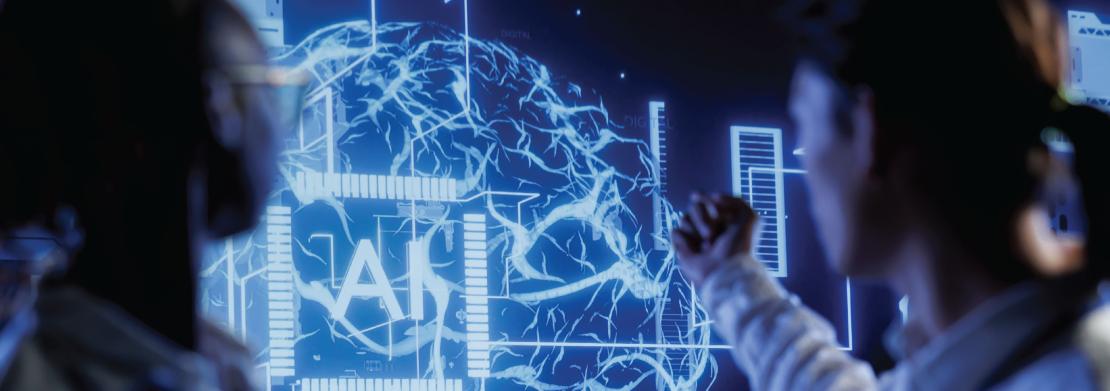From Production to Consumption in Every Aspect of Life: AI
During the Informatics Week held from May 1-7, Prof. Dr. Melike Şah Direkoğlu from the Faculty of Engineering at CIU gave an interview to the CIU News Agency, evaluating artificial intelligence and its impacts on our lives. Direkoğlu stated that the concept of artificial intelligence has been part of our lives for nearly 60 years, and attributed the recent popularity of AI to AI-supported platforms such as chatbots being made available for public use. Direkoğlu emphasized that artificial intelligence is a very broad field and term. She mentioned that there are many subfields under artificial intelligence, and in the interview where she approached AI from different perspectives, she described artificial intelligence as “a technology that touches every area of life from production to consumption, transforming each one.”
1. Could You Briefly Talk About Artificial Intelligence Technologies and Their History? How Did These Technologies Develop and Transform?
Artificial intelligence is a concept introduced by John McCarthy in the 1950s and has continued to evolve since then. Artificial intelligence is not limited to deep learning models; it encompasses technologies aimed at giving computers human-like abilities such as thinking, seeing, and hearing. Today, AI has gained great popularity especially with the public availability of chatbots. Applications like facial recognition technology have also been widely used in the past, and these too are products of artificial intelligence. AI has taken its place in many sectors such as medicine, agriculture, automotive, stock market, and renewable energy, and has even integrated into our daily lives.
Factors that have accelerated the development of artificial intelligence include the accessibility of data and the advancement of high-performance computer hardware. These two factors have enabled AI to be used much more effectively and widely in recent years.
2. What Kind of Effects Have Artificial Intelligence Technologies Had or Are Having on Our Daily Lives?
Artificial intelligence has made data processing faster and more efficient. People can now access data instantly, and AI analyzes this data to make tasks easier. A study conducted by Google showed that while asking a question to a chatbot requires less effort compared to searching manually, AI chatbots quickly gather, analyze, and summarize information. AI has revolutionized many fields such as education, the development of autonomous vehicles, and robots that replace human labor in factories. In the medical sector, it is used in critical areas such as disease detection and intervention.
3. How Will Artificial Intelligence Transform the Workforce and How Might This Change Affect Unemployment Rates?
Artificial intelligence will lead to the disappearance of some professions while reshaping others. Jobs such as translation may be threatened due to machine translation technologies. However, new professions will also emerge; for example, biomedical engineers will work with AI to assist medical doctors. That said, not everyone needs to become an AI engineer; after basic AI training, it is important for individuals to specialize in their own fields. In this way, students can integrate AI into their areas of expertise, enhancing their work rather than being replaced by automation. While AI may cause shifts in employment, it also creates opportunities for new job roles and industries. The key is adapting to these changes through education and training, which will help mitigate potential increases in unemployment rates and prepare the workforce for the future.

4. How Secure Are Our Personal Data with Artificial Intelligence? There Are Concerns About the Ethical Issues and Dangers of AI. What Measures Can Be Taken to Minimize These Risks?
The data used to train AI algorithms often comes from sources like social media and personal online sharing. However, there are growing concerns about how this data is used. To ensure data security in AI, the development of Explainable AI technologies is crucial. This technology aims to make the functioning of algorithms and their use of data transparent and understandable. In addition, it is essential for individuals to be cautious when sharing personal data — only sharing what is necessary. Responsible data handling, ethical guidelines, and regulatory frameworks must also be established and enforced to minimize the potential dangers and ensure AI is developed and used in a way that respects privacy, transparency, and human rights.
5.How Is Artificial Intelligence Transforming Fields Like Creativity and the Arts? How Might the Human Role in These Areas Change?
Artificial intelligence is also revolutionizing the creative industries. Today, it is possible to write a script or even produce a film simply by expressing ideas. Creating artistic paintings or digital artworks has also become achievable through AI. Producing films, creating animations, or generating art on low budgets has become much easier with the capabilities offered by AI technologies. As a result, the human role in creative fields is expected to shift from being the sole creator to becoming more of a creative director or collaborator — guiding AI tools, refining outputs, and adding emotional or contextual depth that machines still lack. Instead of replacing human creativity, AI is likely to augment it, offering new tools for expression and innovation.
6. What Kind of Revolutions Is Artificial Intelligence Expected to Bring in Healthcare? How Will Smart Devices and Digital Health Monitoring Systems Track and Improve Our Health? How Can These Technologies Make Daily Life Easier for Elderly Individuals and Improve Their Quality of Life?
Artificial intelligence is revolutionizing healthcare by enabling rapid data analysis and accurate disease detection. Wearable devices such as smartwatches can measure vital data like heart rate, oxygen levels, and stress, and detect abnormalities in real time. These kinds of devices will help make daily life easier for elderly individuals by providing continuous health monitoring, timely alerts in case of emergencies, and reminders for medication or appointments. By offering personalized insights and early warnings, AI-driven health technologies can significantly enhance quality of life, promote independence, and reduce the burden on healthcare systems.
7. What Will Be the Impact of AI and Automation on Low-Income Countries?
Low-income countries can enhance their production processes by integrating artificial intelligence and automation, making them more efficient. Countries that produce AI technologies will lead in this field, and others may choose to integrate with these AI systems to stay competitive. Such technologies can increase productivity in sectors like agriculture, allowing for greater output at lower costs. This can contribute to economic growth, better resource management, and improved living standards—provided that access to digital infrastructure and education is also ensured.
8. How Should Artificial Intelligence Be Integrated into Cities? What Are Some Examples of This in Northern Cyprus?
Artificial intelligence can help make cities safer and more livable. Smart traffic signal systems can improve traffic management and enhance public safety. In Northern Cyprus, for example, AI-supported smart traffic lights have been implemented on the Balıkesir-Demirhan road. Additionally, AI-powered systems that monitor traffic conditions within cities and provide real-time updates to users are also examples of how AI is being integrated into urban life. These applications demonstrate how AI can contribute to smarter, more responsive city infrastructure.
9. What Will Be the Impact of Artificial Intelligence on the Education System? How Will Personal Development and Teaching Be Shaped in Education?
Artificial intelligence has the potential to bring significant changes to the field of education. It can enable the creation of course content and learning materials tailored to individual students’ needs. By considering students' learning speeds, styles, and specific requirements, personalized education plans can be developed. AI-supported tools can also assist teachers in the instructional process, allowing them to spend more meaningful and efficient time with their students. Additionally, AI can reduce teachers’ workload by automating tasks such as exam grading, providing feedback, and tracking student progress. New-generation applications like personalized learning platforms and robot teachers may become more widespread in the future, making education more adaptive, inclusive, and accessible for all learners.

10. What Kind of Revolution Is Artificial Intelligence Expected to Create in the Transportation and Logistics Sector?
Artificial intelligence is expected to bring a major transformation to transportation and logistics. Technologies such as autopilot vehicles, autonomous transport systems, and intelligent traffic management will make transportation more efficient. Smart transportation systems will regulate traffic flow more effectively and minimize accidents. In particular, autonomous vehicles will enable driverless travel, contributing to safer and more efficient mobility. Smart traffic lights will monitor vehicle speed and traffic density, allowing the system to select the optimal route for each vehicle. Additionally, with AI’s analytical capabilities, transportation routes can be better planned, reducing congestion and improving the overall performance of urban and intercity transit systems.
11. How Should Social Inequalities Related to Artificial Intelligence Be Addressed?
It is essential that everyone benefits equally from the advantages of artificial intelligence technologies. However, with rapid technological advancement, certain social inequalities may emerge or deepen. To address this, equitable access to AI and automation technologies must be ensured. Education systems should equip all individuals with the knowledge and skills needed to adapt to these new technologies, regardless of their socio-economic background. Special support programs should be provided for low-income regions to ensure inclusivity and fair access. Governments and the private sector must work together to make these technologies more accessible, affordable, and inclusive—bridging the digital divide and ensuring that no one is left behind in the age of AI.
12. What Are Your Thoughts on the Future Potential of Artificial Intelligence? How Will AI's Role Be Shaped in the Future?
The future potential of artificial intelligence is immense. Its impact will continue to grow across many fields, including healthcare, education, manufacturing, agriculture, and transportation. However, as these technologies evolve, ethical issues and societal changes will also come to the forefront, requiring thoughtful solutions. We are heading toward a future where humans and artificial intelligence will collaborate—combining their strengths to build more efficient and sustainable systems. AI will not only increase workforce productivity but also enhance the quality and safety of human life. In the years ahead, AI is expected to become an integral part of daily life, contributing to smarter decision-making, improved public services, and innovations that reshape how we live, work, and interact with the world.